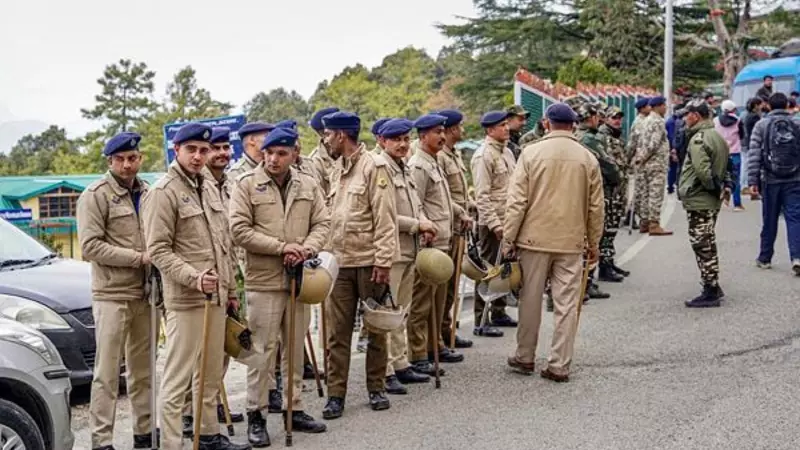
In a controversial incident that has sparked outrage in Jharkhand, police personnel brought an 18-year-old engineering student to his college in handcuffs days after his arrest during a tribal protest, despite alleged oral instructions from a magistrate against using restraints.
The Arrest and Protest Background
The student was among several tribal community members arrested on October 27, 2024 in connection with protests demanding enforcement of the "no-entry" rule for mining and heavy vehicles near an accident-prone stretch in Chaibasa. The protest sought to address safety concerns that locals have repeatedly raised about the dangerous roadway.
According to family members, the young man had turned 18 just weeks before his arrest, making him one of the youngest individuals taken into custody during the demonstrations. The case against him involves allegations of stone-pelting and injuring police personnel during the protests, though specific details about the severity of injuries or evidence remain unclear.
College Visit Turns Into Public Humiliation
The controversy erupted when police escorted the student to Chaibasa Engineering College to complete his examination form submission while he remained in judicial custody. Photographs from the college premises showed the handcuffed student being escorted by uniformed police personnel, creating a scene that his family describes as deliberate public humiliation.
His elder sister revealed that the family had specifically requested the magistrate to ensure her brother wouldn't be handcuffed during the college visit. "The magistrate had also told the police orally that they should not handcuff him, and the police had agreed at the time. But later, they still handcuffed him and took him to the college," she stated in her account to media.
Psychological Impact and Family's Response
The incident has left deep psychological scars on the young student, according to his family. His sister reported that he has been unwell in custody but refuses hospital visits, expressing feelings of being treated as a criminal and fear about how friends and college mates would perceive him after witnessing him in handcuffs.
The family has demanded accountability from both district police and jail administration for what they term the "public humiliation" of their son. They emphasize that the handcuffing occurred despite clear instructions from judicial authorities, raising questions about police procedure and human rights protections for accused individuals.
Police Justification and Legal Standoff
Police officials have defended their actions as standard procedure. Sub-Divisional Police Officer Bahman Tuti stated that when someone is in judicial custody and must be taken outside, handcuffs may be used during transportation, particularly if there's any possibility of escape. He emphasized that without specific written court orders instructing otherwise, escorting police must follow established protocols.
"Since the request in this case was not in writing, police could not take that risk," Tuti explained, noting that if an accused escapes, responsibility falls entirely on escorting officers, potentially costing them their jobs. "The jail administration also cannot act on oral instructions—it must follow written directions or established rules," he added.
West Singhbhum SP Amit Renu also supported the police position, stating they were following due process while acknowledging that "if there is anything unlawful, necessary action will be taken against the delinquent officers."
College Administration's Perspective
A senior official from Chaibasa Engineering College provided insight into standard procedures for students in custody. Typically, when a student in judicial custody needs to appear for examinations or registration, the college receives written court orders or formal communication from authorities. However, in this instance, college officials were unaware the student would be brought until the actual day of the incident.
"In the past, we have had instances where students in custody were allowed to appear for exams. Their parents had to seek court permission, and police personnel would accompany them. During the exam, they were not handcuffed inside the hall, but remained under police supervision from outside," the official explained.
The college staff reportedly asked the accompanying police team to share documents stating the reason for custody and process guidelines, but "they refused." The official personally believed the student shouldn't have been brought in handcuffs but noted that "as a college, we cannot impose such directions on police without a court order."
Broader Implications and Ongoing Developments
This incident highlights the tension between police procedure and individual rights in India's judicial system, particularly concerning young accused individuals. The case raises important questions about when handcuffing is appropriate and whether oral instructions from magistrates should carry more weight in such sensitive situations.
The family continues to seek justice for what they perceive as unnecessary humiliation, while police maintain they followed established protocols. As the student remains in custody facing charges related to the protest, the psychological impact of the handcuffing incident adds another layer of complexity to an already contentious situation.
Legal experts suggest this case might prompt discussions about reforming police procedures regarding the treatment of student accused, particularly when they pose minimal flight risk and are cooperating with authorities. The incident serves as a reminder of the delicate balance between security concerns and preserving the dignity of individuals within the justice system.






